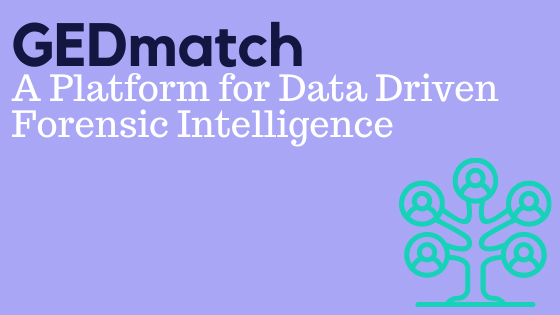Today’s blog is written by Swathi A. Kumar, Director of Product Management at Verogen. Read the full version in the November 2020 issue of The ISHI Report.
GEDmatch is a genetic genealogy website with over 1.4M users who want to learn more about their genetic roots. It was set up in 2010 with the mission of using science to connect people and has since been used by amateur and professional researchers and genealogists, including adoptees looking for their birth parents. GEDmatch users begin this process of discovery by taking a DNA test from direct to consumer (D2C) companies, like Ancestry, 23&me, My Heritage, Family Tree, and others. They upload the results of this test to GEDmatch, which allows them to compare their history with others, irrespective of which vendor they used.
GEDmatch rose to prominence in the public sphere following the arrest and prosecution of the notorious Golden State Killer. Former California police officer Joseph James DeAngelo, who pled guilty to 13 counts of murder and 13 counts of kidnapping with robbery, eluded a statewide hunt that began in the 1970s. After decades of traditional police investigative methods turned up few leads, law enforcement got their first break after comparing DNA collected from the crime scenes with matches in GEDmatch, which helped them narrow down the field of suspects. Falling back on well-established investigative methods for suspect inclusion or exclusion the police were able to bring this investigative odyssey to an end with Joseph DeAngelo’s sentencing on August 21st, 2020.
Verogen was founded in August 2017 with the mission of transforming criminal justice and human identification by providing the tools necessary for genetic and biometric linkages. With its acquisition of GEDmatch in 2019, Verogen is driving the adoption of next generation sequencing to find answers for cases that were previously unsolvable.
During ISHI 31, Swathi A. Kumar, Ph.D., Director of Product Strategy at Verogen, in partnership with Kirk Campbell – Lieutenant Supervisor at the Sacramento County District Attorneys (SCDA) Office discussed the investigative odyssey associated with cold cases and how GEDmatch has the enabled SCDA to bring closure to the families affected by these cases. These included the infamous Golden State Killer (GSK) case, the capture of the NorCal killer, Roy Watkin and the exoneration of Ricky Davis who was wrongly imprisoned for 15 years. Kirk Campbell highlighted the six genealogy tools that his team use in most cases, as well as how they interpret the outcomes from these tools. Dr. Kumar then highlighted various factors like underlying genomic technology, assay considerations, input quantity and quality that impact outcomes in GEDmatch. Finally the audience was given a preview of the GEDmatch roadmap, including how Verogen has been strengthening the security and privacy of user data in GEDmatch, improving the user experience of the website, adding new genealogy tools and their plan for delivering a dedicated law enforcement portal for forensic use.
As there was not enough time for Dr. Kumar to answer all the questions that came in during the conference, we have compiled them here. If you have any additional questions about Verogen, their forensic genetic genealogy solutions, the MiSeq FGx Sequencing System or GEDmatch, please reach out to Verogen.
Several people have had questions about data privacy. Will Verogen sell genetic data to Law Enforcement or anyone else?
No, Verogen has repeatedly communicated that it will not sell users genetic data to anyone, including law enforcement. Not only do we remain steadfast in our commitment to protecting users’ privacy and data rights, we have also made extensive investments in GEDmatch to strengthen its overall privacy position such as limiting exposure to medically relevant SNPs and providing multiple levels of data control privileges within the platform. GEDmatch users have the absolute right to choose whether they want to share their information, with whom that information can be shared and how it is used.
Can you let us know a little bit about the Verogen genetic genealogy assay?
As a human identification company serving the needs of the forensic community, Verogen is acutely aware of the challenges inherent in forensic samples. As stewards of GEDmatch, we also understand how the current technologies on market enable less-than-ideal outcomes and do so without addressing larger concerns about genetic privacy.
These challenges and concerns led us to build our fit-for-forensic-purpose forensic genetic genealogy assay that uses a targeted approach to interrogate parts of the genome that are relevant for forensic use, unlike current solutions that also reveal medically relevant data. We have extensively tested our solution with low quality DNA and degraded or inhibited samples that are commonplace in forensics. The ForenSeqTM DNA Signature Prep Kit currently supports input quantities as low 1ng and we expect our forensic genetic genealogy assay to meet the exacting standards that the forensic community deserves. The assay will run on Verogens NDIS-approved gold standard NGS platform, the MiSeq FGx Sequencing System, that is currently deployed in multiple operational Forensic Labs around the world. Finally, the data analysis will be supported by solutions that have been designed, engineered, and confirmed with criminalists and forensic analysts. The SNP data can be uploaded to GEDmatch in a way that respects chain-of-custody constraints and requirements that are critical to the handling of forensic samples and data.
Can you tell us a little more about GEDmatch PRO? How will Verogen transition LE users in GEDmatch to GEDmatch PRO?
At ISHI 31, we announced that we will be delivering a dedicated portal for forensic use of GEDmatch. Shortly thereafter, we released additional details, including the name of this portal – GEDmatch PRO. GEDmatch PRO has been designed in partnership with law enforcement users of GEDmatch, as well as with genealogists who work with law enforcement. Differentiating GEDmatch PRO from GEDmatch allows us to meet the unique needs and requirements of law enforcement while preserving the primary purpose of GEDmatch: enabling users to learn more about their roots. More details on the portal will be released closer to launch. We will move law enforcement kits and accounts from GEDmatch to GEDmatch PRO in close communication with the account holders prior to launch, so they will have not have to move their kits themselves.
How will Verogen respond to subpoenas and court orders, or disclose all relevant information regarding GEDmatch PRO to defense attorneys if requested in a relevant case?
Verogen is comitted to protecting the choices of our users and strongly believes in their right to control what data is shared and how it is used. Verogen would not voluntarily support requests to disclose information of our users who have not actively opted in for law enforcement matching.
How will Verogen stop law enforcement files from being uploaded to the main database against Terms of Service (ToS)?
With the launch of GEDmatch PRO, law enforcement related kits will no longer be accepted on GEDmatch. The GEDmatch Terms of Service (ToS) will be updated to reflect this, along with the implications for violating these terms. Additionally, new and separate ToS for GEDmatch PRO will clearly outline the proper use of the site.
Are there any differences in privacy options for DNA of deceased persons compared to living?
Yes, quite a bit of difference. In the US, there are no federal laws that specifically extend privacy protection to deceased individuals. In the EU, there are no privacy rights granted to deceased individuals under the General Data Protection Regulation (GDPR).
Do you find that data from minority populations is not as prevalent in GEDmatch? Have there been successful outcomes in law enforcement cases involving minorities?
The GEDmatch database contains more kits from individuals of northern European descent. That said, there have been cases involving minority populations that have been successfully solved using GEDmatch.
What tools within GEDMatch are available to specifically filter out areas that are often imputed for the reports on shared centimorgans?
GEDmatch does not have filters to detect and filter out imputation per se, but it does have filters that detect and block the upload of kits that match too much of the database. In our experience, this is often seen with kits that have been poorly or overly imputed.
Regarding added upload restrictions on bioinformatically engineered data, bioinformatics is often used to enhance degraded DNA from crime scene DNA and Doe kits. How will that affect those kits? Will kits uploaded via GEDmatch PRO not be part of those restrictions?
GEDmatch and GEDmatch PRO will have the same filters that detect and block kits that match too much of the database. For permission to upload such kits, please reach out to us at gedmatch@verogen.com so we can assess the need individually.
Will GEDmatch be expanded to Latin American countries, or has this not yet been contemplated?
We are constantly evaluating new capabilities that will enable us to better serve our users. Expanding to other geographies is a potential future direction for GEDmatch.
WOULD YOU LIKE TO SEE MORE ARTICLES LIKE THIS? SUBSCRIBE TO THE ISHI BLOG BELOW!
SUBSCRIBE NOW!



